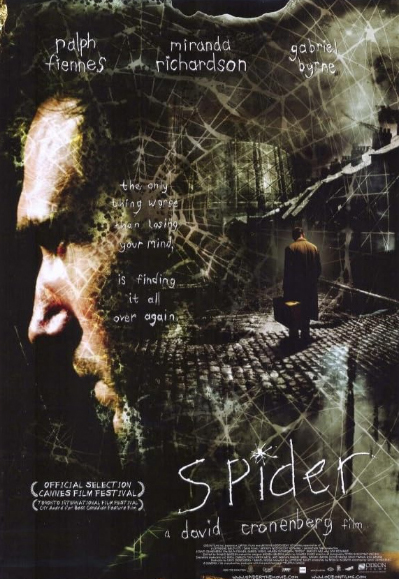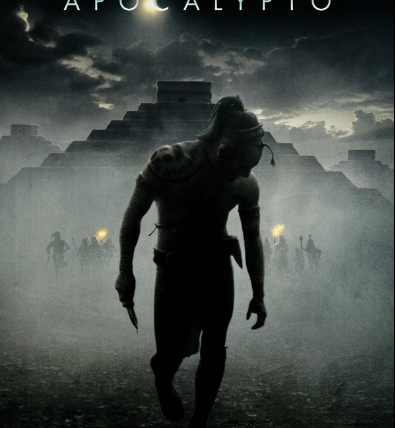After reading through some of the reviews for Spider (2002) and a few other films that explore a number of related subjects, I have come to the opinion that modern audiences don’t want to be challenged. A terrible fact indeed, considering that Spider by David Cronenberg is among the more demanding English-language films produced in recent years. The movie draws the audience into the lead character’s mind and lets them wander through a wavy maze of fact and fiction, reality and fantasy, the conscious and the subconscious, etc. It is told in an entirely subjective manner and owes a lot to writers like William S. Burroughs, Franz Kafka, Jean Paul Sartre, and Albert Camus. The movie’s symbolic side exhibits Cronenberg at his finest; he abandons the juvenile sex and violence of his earlier works in favour of expanding on the same intensely psychological mind-space first explored in his 1988 film Dead Ringers. Additionally, his two contentious literary adaptations from the 1990s, Naked Lunch (1991) and Crash (1998), which both presented the world through the eyes of a troubled man, have a certain air of familiarity about them.
Cronenberg has always found it enjoyable to chronicle the downward spiral of characters who have been psychologically wounded, but novelist Patrick McGrath has produced one of the most iconic examples of a cinematic schizophrenic with the character of Spider. Spider embodies each and every example of a raving lunatic that we have ever encountered, from his ridiculously oversized shoes to his book of meaningless babble. The performance could have very easily drifted towards Rain Man territory if it were in the hands of lesser actors; however, since Ralph Fiennes was playing the major role, this was never a threat. Since he was able to rid himself of any remnants of hammy overacting during his role as The Tooth Fairy in Red Dragon (2002), he is now free to develop a subtler, less showy role that requires little more than simply “acting.” As he sits in smoky canteens dressed in a filthy raincoat, unkempt trousers and with vivid yellow nicotine stains on his fingers, his whole appearance is one of complete and utter disheveling. If we could actually step into the movie, we would have the distinct impression that the air would be thick with the odour of urine.
Spider is at its best when it is functioning as a riveting detective narrative, even when it is documenting the more disturbing aspects of mental illness or the appalling living circumstances of the British halfway-house system. We, the audience, are here to follow Spider as he follows his numerous webs back to that one fateful night; analysing the facts and piecing back together the pieces that have been separated. There is also a semi-nonsense voice over or stream of conscious thought pattern that is mumbled by our ‘hero’ throughout, which helps provide some light on the mystery at hand without necessarily giving too much away. In addition to that, the movie serves as a platform for underappreciated actors. Fiennes, who plays the major role, is, of course, fantastic, but Miranda Richardson, who plays the mother of the spider boy and also serves as the primary mystery in the picture, is equally impressive. However, she is supposed to be playing the fevered incarnation of womanhood as represented from the mind of a very troubled boy, so what do you expect? Her portrayal has been panned by some as being nearly larger than life, like a caricature. As was said before, the film operates from an entirely subjective point of view. Everything in the film has been reorganised and readapted to better fit the deteriorating state of mind of the main character, and this is done throughout the entire film.
Cronenberg produces a representation of Britain that has more in common with The Cabinet of Dr. Caligari (1920) than anything that even remotely resembles old London town by keeping this in mind when he makes his creation. The movie does not feature any automobiles, and other than a few specific sequences, there are not many extras or other characters. Because of this, Spider is able to explore the vacant streets and empty allotments as if he were perpetually walking about his own broken and estranged mentality. Gabriel Byrne, who plays Spider’s father, is similarly engaging, but his portrayal is characterised by a great deal of subtlety. John Neville’s role as Spider’s only company in the halfway home is even more subtle, and criminally underrated. His representation of psychosis and old age is very modest and restrained, which results in a performance that is both intriguing and scary. Many viewers are able to pick up on the circular theme that connects these two distinct individuals. Is Spider modelled like Terence in any way? Perhaps. Even more intriguing is the character of Mrs. Wilkinson, who may or may not be the very same woman who initially flashes her breast at young Spider, so setting off the events of the movie. If she does not make an impression, it may be due to the fact that the character has been simplified from the book to the film, which will invariably result in important narrative points being omitted.
This movie and the Ron Howard movie “A Beautiful Mind” share a common theme in that they both investigate the complexities of mental illness. There are many ways in which the two movies are comparable to one another. Cronenberg continues to demonstrate that less is more when it comes to filmmaking, in contrast to Howard’s approach, which was modelled after the glamorous Hollywood style and included government agents and the adventures that go along with them. Spider is a lot more powerful than other similar works due to the fact that it does not sugar coat the issue but rather approaches the problem with unfiltered realism.
Cronenberg is without a doubt one of the most misunderstood and underappreciated directors working in this day and age in terms of his appeal to the general public. His films are not designed for mass marketing and popcorn sales; rather, they present the audience with psychological and sociological challenges to overcome while watching them. In typical fashion for a Cronenberg movie, the viewer is required to submit to a disturbing reality while watching Spider, and this is not an exception. The fragmented view that the protagonist provides, as seen through Cronenberg’s eye, is absolutely original and invigorating.
Spider is not the movie for you if you are the type of person who is looking for something simple and quick to delight them. If, on the other hand, you are interested in delving into the bizarre reality of a mentally sick individual in a way that is masterfully constructed and presented, Spider will leave you wanting more. Cronenberg has demonstrated, once again, that there are very few directors who possess the talent and expertise that he possesses. This viewer is always pleased when he sees that he is capable of giving a film a completely unique atmosphere that cannot be compared to that of any of his peers.
This is the kind of movie that gets better the more times you watch it, and as someone who enjoys cinema that is engaging, thrilling, and cerebral, I welcome it with open arms. There are some people who will, without a doubt, find the movie to be a genuine chore, while there are others who, I would hope, would find something inside this dark and complicated story that they might enjoy. To say more would be to say too much, but suffice it to say that those who are ready to let themselves become entangled in the spider’s web will be rewarded by the film….



